Foreign real estate investors have put even their most advanced deals on ice in fear of further sanctions over Ukraine, potentially opening the market to domestic investors as they funnel capital back home for precisely the same reason.
Investment in commercial real estate is widely expected to fall this year: Jones Lang LaSalle last week lowered its previous forecast of $7 billion to $3.4 billion for 2014, down from $8.1 billion invested last year.
"At the moment most investment transactions are on hold, everybody is waiting to see what will happen in the next month or so," said Stanislav Bibik, executive director of the capital markets department at Colliers International.
In the first quarter, the market saw $151 million invested in the office segment, $349 million in retail and $142 in land for further development, according to Colliers International.
Monday was not encouraging for foreign investors active in Russia, as tensions continued to rise in the primarily Russian-speaking regions of eastern Ukraine. A group of pro-Russian protestors, having on Sunday seized the building of the Donetsk regional administration, declared intentions to hold a referendum on the creation of an independent republic by May 11, Interfax reported.
The political tension and fear of further sanctions from the U.S. and the European Union puts foreign investors in a highly uncomfortable position, and overall investment along with them.
Foreign investors such as Morgan Stanley, Hines, Heitman and Sponda have played a key role in the Russian market over the past five years, Bibik said. The largest deal of 2013 was Morgan Stanley's record-breaking $1.2-billion purchase of shopping center Metropolis in northern Moscow.
Foreign companies' market share had been increasing after a dip during the crisis of 2008 and 2009, rising to about 30 percent of all commercial real estate investments in 2013, said Denis Sokolov, head of research at Cushman & Wakefield.
This year that share could fall to between 5 and 10 percent, he said.
While foreign investors reconsider their Russian activity in fear of sanctions, this same fear is driving Russian capital home and into the open arms of the real estate market.
"In Russia actually there are not many investment vehicles at all. The stock market is very risky and volatile, while commercial real estate, for example, provides pretty good returns and good security," Sokolov said.
In view of this repatriated capital, Cushman & Wakefield is forecasting investments totaling $5 billion in 2014.
If foreign investors do exit the market, they would be yielding further market share to "new, huge local players on local soil," who have been gathering strength over the past three to five years, said Vitaly Mozharowski, head of real estate at law firm Goltsblat BLP.
Although transactions are falling, development of new facilities will continue, as Russian and foreign retailers have continued to declare plans for expansion, Mozharowski said.
Construction of office real estate, traditionally one of the safest investment vehicles, is likely to suffer most from the current conditions, he added.
"International and global corporations that traditionally consume dozens of square meters or even entire towers or business centers, now they are hesitating in their plans for further expansion in Russia," Mozharowski said.
As administrative spaces, offices are more vulnerable to the unstable economic situation than retail spaces, especially as the vacancy rate in Class A office spaces already stands at between 15 and 17 percent. For well-positioned retail locations, it is easier to find a co-investor, attract local capital and receive financing from banks, Collier International's Bibik said.
And so, even as transactions falter, retail space is still expected to expand rapidly, with 2.6 million square meters of shopping center space to be built in 2014 and 2015, Cushman & Wakefield said in a report.
If all projects go ahead as planned, Russia will overtake Britain as the second-largest market for shopping centers by the end of this year and beat out France for first place in 2015, it said.
Contact the author at [email protected]
A Message from The Moscow Times:
Dear readers,
We are facing unprecedented challenges. Russia's Prosecutor General's Office has designated The Moscow Times as an "undesirable" organization, criminalizing our work and putting our staff at risk of prosecution. This follows our earlier unjust labeling as a "foreign agent."
These actions are direct attempts to silence independent journalism in Russia. The authorities claim our work "discredits the decisions of the Russian leadership." We see things differently: we strive to provide accurate, unbiased reporting on Russia.
We, the journalists of The Moscow Times, refuse to be silenced. But to continue our work, we need your help.
Your support, no matter how small, makes a world of difference. If you can, please support us monthly starting from just $2. It's quick to set up, and every contribution makes a significant impact.
By supporting The Moscow Times, you're defending open, independent journalism in the face of repression. Thank you for standing with us.
Remind me later.






